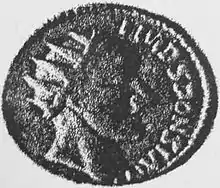Sponsianus
Sponsianus is believed to have been a Roman usurper, who attempted to seize the throne during the 240s, likely during the rule of Philip the Arab. The sole evidence for his existence is a single aureus of dubious quality.

Evidence
The sole evidence found for his existence was from a single aureus, found in 1713 in Transylvania, among coins bearing the inscription of Philip the Arab and Gordian III, bearing the inscription of Sponsianus. The numismatist Henry Cohen believed them to be "very poor quality modern forgeries". However, according to the ancient numismatist Wayne Sayles, as the usurpers and emperors of the time were often ephemeral, the lack of coins should not be seen as evidence that Sponsianus did not actually exist.[1] The problems with the aureus are twofold: firstly, the obverse (face) side of the coin is "barbaric and strange" according to the findings of the Roman Imperial Coinage, and the reverse (tail) side of the coin appears to be a copy of a Republican denarius struck in 135 BC.[2]
History
Based upon the location of the aureus, if it is legitimate, it would place Sponsianus' ruling period sometime in the 240s.[3] It is believed that this would have taken place entirely within the rule of Philip the Arab (244–249 AD).[4] Based upon the location of his aureus, he is believed to have staged his revolt in Pannonia.[5]
References
Citations
- Sayles 2007, p. 121.
- Vagi 2000, p. 331.
- Hartmann 1982, p. 121.
- Mennen 2011, p. A1.
- Goldsworthy 2009, p. 427.
Bibliography
- Goldsworthy, Adrian (2009). How Rome Fell: Death of a Superpower. Yale University Press. ISBN 9780300155600.CS1 maint: ref=harv (link)
- Hartmann, Felix (1982). Herrscherwechsel und Reichskrise : Untersuchungen zu den Ursachen und Konsequenzen der Herrscherwechsel im Imperium Romanum der Soldatenkaiserzeit (3. Jahrhundert n. Chr.). P. Lang. ISBN 978-3820461954.CS1 maint: ref=harv (link)
- Mennen, Inge (2011). Power and Status in the Roman Empire, AD 193–284. Brill. ISBN 9789004203594.CS1 maint: ref=harv (link)
- Sayles, Wayne G. (2007). Ancient Coin Collecting III: The Roman World. KP. ISBN 9780896894785.CS1 maint: ref=harv (link)
- Vagi, David L. (2000). Coinage and History of the Roman Empire, c. 82 B.C.- A.D. 480. Fitzroy Dearborn. ISBN 9781579583163.CS1 maint: ref=harv (link)